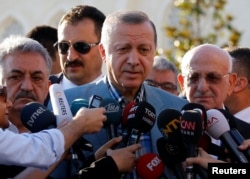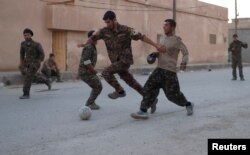Kurdish officials say they have spotted increasing numbers of Turkish troops and military equipment gathering on the border after Turkey's president threatened to send his forces into northern Syria to pursue groups that Turkey sees as supporters of Kurdish militants.
The threat of an incursion comes two months after the Turkish military bombed Kurdish targets inside northern Syria, before U.S. troops began patrolling along the border in defense of Syrian Kurdish forces known as the YPG — a group Ankara calls a terrorist organization — and to prevent direct confrontations between the two sides.
Turkey's military said Wednesday it destroyed YPG targets in the Afrin district in retaliation for Kurdish artillery fire against Turkish-backed forces in northern Syria.
“The Turkish state from the north has been gathering its troops with the Syrian groups who call themselves the Syria opposition for a week,” according to Hevi Mustafa, co-chair of the executive council of the self-proclaimed Kurdish Afrin Canton in northern Syria.
“The Turkish state is planning to attack our cities and villages in Afrin with its tanks and troops,” she told VOA.
Turks could disrupt operations targeting Raqqa
Mustafa said an attack would ultimately disrupt the ongoing U.S.-backed Syrian forces' operation to liberate Raqqa, Islamic State's de-facto capital.
The Kurdish People's Protection Units, or YPG, are a key part of the U.S.-backed Syrian Democratic Forces. While the United States supports the YPG and sees it as a key partner in the fight against IS, Turkey considers it a terrorist organization linked to Turkish-Kurdish separatists inside Turkey, known as the PKK.
To counter the YPG's growing influence in northern Syria, Turkey has supported efforts by several militia groups, part of the rebel Free Syrian Army, to gain control of a large swath of land in northern Syria.
A Turkey-supported operation known as Euphrates Shield, which involved Turkish troops and tanks and some FSA factions, entered northern Syria in August 2016 and ended in March. The area along the Turkey-Syria border remains under the Turkish army's control.
Turkish President President Recep Tayyip Erdogan has warned in recent days that Turkish troops could cross into northern Syria to prevent the YPG from helping Kurds to form what he called “a state.”
Heavy shelling since late Tuesday
It is not known if there were any casualties from the most recent clashes, but activists in northern Syria said heavy Turkish artillery shelling in Afrin started late Tuesday and continued into early Wednesday morning.
Roj Musa, a journalist from Afrin, told VOA the barrage started after severe clashes between the YPG and Turkey-backed opposition groups near Menagh Military Airbase, 15 kilometers east of Afrin. He said the fighters backed by Turkey were not able to seize the airbase, which has been under YPG control since February.
“Turkish artillery pounded the airbase with hundreds of shells for about eight hours,” Musa said.
The conflict-monitoring Syrian Observatory for Human Rights group says tensions rose after Turkish reinforcements arrived in the countryside near Azaz, roughly 20km northeast of Afrin. It said the development was a part of “continued preparations” by the Turkish forces and their Syrian allies “to carry out a wide-scale military operation against the Syria Democratic Forces.”
Asked earlier this week if the U.S.-led coalition was aware of the Turkish build-up, a spokesman, Colonel Ryan Dillon, confirmed that American units had “seen some movement” on the border, but declined further comment.
‘Land IS seized belongs to local residents'
Following reports that the Turkish military was working to establish a “national army” for Free Syrian Army fighters to operate in northern Syria's Jarabouls and al-Bab areas, U.S. Army Colonel Joseph Scrocca said the U.S.-led coalition “feels strongly that any land seized (from Islamic State) should be returned to the people and governed by local representatives from that area.”
He said the coalition's focus was on defeating IS in Syria and Iraq, and “we urge all of our partners and allies to do the same.”
Analysts say recent developments on the ground point to a rise in tensions between Turkey and the YPG.
“If Turkey feels that its nerve-endings are irritated or provoked by others, it would not hesitate to start an extensive military operation,” Metehan Demir, a Turkish defense and military analyst, told VOA.
He said Washington should use its leverage to stop the outbreak of violence between two of its closest allies in the region from escalating.
VOA's Kasim Cindemir contributed to this report from Washington.







